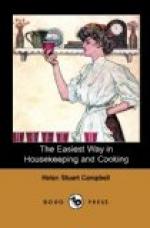For ironing neatly and well, there will be required, half a dozen flat-irons, steel bottoms preferred; a skirt-board and bosom-board, both covered, first with old blanket or carpet, then with thick strong cotton-cloth, and over this a cover of lighter cloth, sewed on so that it may be removed as often as may be necessary to wash it. If a bag the size of each is made, and they are hung up in this as soon as used, such washing need very seldom be. Having these, many dispense with ironing-sheet and blanket; but it is better to use a table for all large articles, and on this the ironing-sheet can be pinned, or tied by tapes, or strips of cloth, sewed to each corner. A stand on which to set the irons, a paper and coarse cloth to rub them off on, and a bit of yellow wax tied in a cloth, and used to remove any roughness from the iron, are the requirements of the ironing-table.
Once a month, while the irons are still slightly warm, wash them in warm water in which a little lard has been melted. Never let them stand day after day on the stove, and never throw cold water on them, as it makes them very rough.
If the starch clings to the irons, put a little Bristol-brick on a board, and rub them up and down till free. If they are too hot for use, put in a current of air a few moments; and in all cases try them on a piece of paper or cloth before putting them on a garment. If through carelessness or accident an article is scorched, lay it in the hottest sunshine to be found. If the fiber is not burned, this will often take the spot entirely out.
Let the ironed clothes hang in the air for at least twenty-four hours after ironing. Unaired sheets have often brought on fatal sickness. Examine all clothes sent up from the wash. If the laundress is sure this inspection will take place, it is a constant spur to working in the best way, and a word of praise for good points is always a stimulus. Mending should be done as the clothes are looked over, before putting away. Place the sheets from each wash at the bottom of the pile, that the same ones may not be used over and over, but all come in rotation; and the same with table-linen. If the table-cloth in use is folded carefully in the creases, and kept under a heavy piece of plank, it will retain a fresh look till soiled. Special hints as to washing blankets and dress-materials will be given in the latter part of the book.
However carefully and neatly a house may be kept, it requires a special putting in order, known as House-cleaning, at least once a year. Spring and fall are both devoted to it in New England; and, if the matter be conducted quietly, there are many advantages in the double cleaning. In a warmer climate, where insect-life is more troublesome and the reign of flies lasts longer, two cleanings are rather a necessity. As generally managed, they are a terror to every one, and above all to gentlemen, who resent it from beginning to end. No wonder, if at the first onslaught all home comfort ends, and regular meals become irregular lunches, and a quiet night’s rest something sought but not found.




